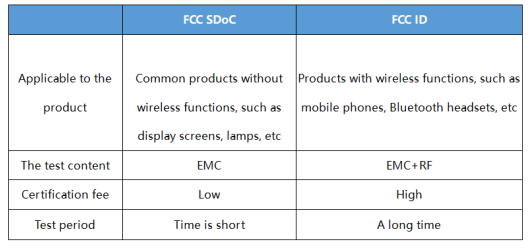Certification Introduction:
The full name of the FCC is the Federal Communications Commission, and the Chinese is the United States Federal Communications Commission. Established in 1934 by COMMUNICATIONACT, it is an independent agency of the U.S. government and is directly accountable to Congress. The FCC coordinates domestic and international communications by controlling radio, television, telecommunications, satellite and cable. Involving more than 50 states in the United States, Columbia and the United States In order to ensure the safety of radio and wire communication products related to life and property, the FCC Engineering and Technology Department is responsible for the technical support of the committee and is responsible for equipment approval. Many radio application products, communication products and digital products require FCC approval to enter the US market.

● As a global authoritative third-party testing and certification agency, BACL is an FCC TCB certification agency approved by A2LA, and has been recognized by the FCC for all projects, and has a full set of qualifications for FCC ID testing and certification.
● At present, there are nine FCC, ISED and other authorized test laboratories in the world, including: the United States, Shenzhen (Futian/Nanshan/Baoan), Dongguan, Taiwan (Xizhi/Linkou), Chengdu, Kunshan, etc., with 10m, 3m There are more than 20 anechoic chambers and several sets of advanced SAR specific absorption rate test systems, and the highest test frequency can reach 325GHz.
● BACL has perfect authorization qualifications and rich certification experience in the field of electromagnetic compatibility, and can provide you with high-quality electromagnetic compatibility, radio frequency, telecom terminal, SAR, 5G mobile communication, OTA, microwave/millimeter wave, Wi-Fi 6E, etc. One-stop testing and certification services.
FCC Certification Basic Information:
• Is it mandatory: yes
• Controlled products: 9K-3000GHz electrical and electronic products
• Factory inspection: none
• Certificate validity period: none
• Local testing: currently partially required
• Local agent: FCC Part 68 required, others not required
• Service advantages: BACL is an FCC TCB laboratory, which can directly issue FCC ID reports and certificates
Authentication Type:
On November 2, 2017, the FCC merged DoC and Verification into SDoC (Supplier's Declaration of Conformity). SDoC certification will replace the FCC Verification and DoC certification procedures, and all equipment applicable to the FCC Verification and DoC certification procedures are SDoC certification procedures can be taken.
The FCC divides the types of electronic products into two different certification methods: FCC SDoC and FCC ID (Certification). The former is suitable for ordinary products without wireless functions, and the latter is suitable for products with wireless functions.
Comparison Between FCC SDoC and FCC ID

Applicable Product Range:
1. Power supply: communication power supply, switching power supply, adapter, wireless charging, charger, display power supply, LED power supply, LCD power supply, UPS, etc.;
2. Lamps: ceiling lamps, wall lamps, chandeliers, track lamps, garden lamps, portable lamps, down lamps, street lamps, string lights, table lamps, floor lamps, grill lamps, aquarium lamps, energy-saving lamps, LED street lamps, LED desk lamps, LED floor lamps , LED ceiling lights, LED spotlights, LED bulbs, LED tubes, LED lamps, energy-saving lamps, T8 lamps, etc.;
3. Home appliances: refrigerators, washing machines, electric fans, tower fans, bladeless fans, air-conditioning fans, mobile air conditioners, humidifiers, dehumidifiers, clothes dryers, clothes dryers, air purifiers, fresh air systems, vacuum cleaners, cleaning machines, Mite removal machine, sweeping robot, air conditioner, range hood, dishwasher, electric oven, disinfection cabinet, integrated stove, commercial kitchen equipment, electric water heater, air energy water heater, electric hot water faucet, water purifier, water dispenser, juicer , juice maker, wall breaker, coffee maker, bread maker, electric oven, air fryer, egg beater, electric stew pot, cooking machine, rice cooker, yogurt maker, noodle maker, electric pressure cooker, soy milk maker, Microwave oven, induction cooker, electric ceramic cooker, electric cake stand, electric kettle, hair dryer, beauty instrument, facial cleanser, hair curler, hair straightener, hair clipper, shaver, oral care, epilator, massage chair, massager, weight scales, etc.;
4. Electronics: TV, audio, power amplifier, DVD, VCD, projector, camera, monitor, computer, server, scanner, printer, copier, earphone, mouse, keyboard, router, mobile phone battery, laser pointer, etc.;
5. Communication products: telephones, fax machines, telephone recorders, data machines, data interface cards and other communication products.
6. Wireless products: Bluetooth BT products, tablet computers, wireless keyboards, wireless mice, wireless readers, wireless transceivers, wireless walkie-talkies, wireless microphones, remote controls, wireless network devices, wireless image transmission systems and other low-power wireless products Wait;
7. Wireless communication products: 2G mobile phone, 3G mobile phone, 3.5G mobile phone, 4GS mobile phone, Internet card, DECT mobile phone (1.8G, 1.9G frequency), wireless walkie-talkie, etc.;
8. Machinery: gasoline engine, electric welding machine, CNC drilling machine, tool grinder, lawn mower, washing equipment, bulldozer, elevator, punching machine, dishwasher, water treatment equipment, gasoline welding machine, printing machinery, woodworking machinery, rotary Drilling rigs, lawn mowers, snow blowers, excavators, printing presses, printers, cutters, road rollers, trowels, brush cutters, hair straighteners, food machinery, lawn mowers, etc.
FCC Common Standards:
Among them, FCC PART 15 and PART 18 are the most widely used, and the scope of application of FCC standards:
• FCC PART15 C/E/F Intended Radiation Device Test
• FCC PART 18 Industrial, Scientific and Medical Equipment
• FCC PART 22 Public Mobile Communication Services
• FCC PART 24 Personal Communication Services
• FCC PART 25 satellite communication services
• FCC PART 27 other FCC wireless communication services
• FCC PART 68 Telecommunications Terminal Equipment
• FCC Part 15 regulates transmitting equipment that is intentional, unintentional, or transient and does not require a personal license for use. It includes technical specifications, administrative requirements and other market access conditions. Products are mainly divided into four categories: unintentional launch equipment, intentional launch equipment, license-free personal communication equipment, and license-free national basic information equipment.
• FCC Part 18 regulates the emission of electromagnetic energy by industrial, scientific, and medical equipment (ISM) operating in certain frequency spectrums to avoid harmful interference to authorized wireless communication services.

 CN/中国
CN/中国  US/USA
US/USA  KR/Korea
KR/Korea  DE/Germany
DE/Germany  ES/Spain
ES/Spain VN/Việtnam
VN/Việtnam